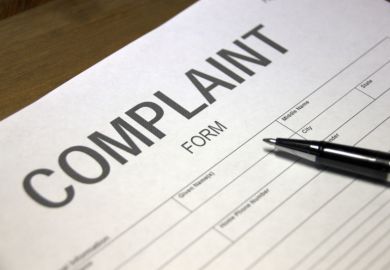The Biden administration is signalling plans to tighten rules for the accreditation of US universities, though not to the degree that student advocacy groups see as necessary in the fast-moving era of online instruction.
The administration recently completed a wide-ranging negotiated rule-making session on matters of institutional quality in which it largely agreed that campuses and states have been pursuing some oversight shortcuts in the name of efficiency that might exacerbate many of the problems it has been battling in the student loan context.
Those issues include the ability of institutions to seek accreditation from evaluators that appear most beneficial to them, to keep their accreditation for years despite failed reviews and the practice of states relying on the accreditors and other states for their own institutional review processes.
On balance, the process appears to have produced a net gain for student and taxpayer protections, said one of the participants, Barmak Nassirian, the vice-president for higher education policy at Veterans Education Success.
But it could be a long time before that actual effect is known, Mr Nassirian said. “Because, candidly, everything else we do, at the end of the day, depends on good-faith execution,” he said.
Negotiated rule-making is a somewhat arcane practice of the federal government in which the president’s administration can write regulations that fill out the details of laws passed by Congress. The process generally requires administration officials to assemble a group of affected parties and to hear their suggestions, but not necessarily incorporate any particular elements into the final regulatory language.
The Trump administration undertook its own such process, producing key changes that included ending the geographical system of one main government-recognised accrediting agency in each of six regions spread across the US.
An institution needs the approval of such an accreditor for its students to be eligible for federal aid. Student advocates warned that the Trump move could embolden the venue-shopping practice pioneered by for-profit online institutions that seek the locations and agencies that give them the most favourable accreditation reviews.
Some of the more egregious past examples of institutions choosing their accreditors, Mr Nassirian said, included the for-profit American Public University system moving its headquarters from Virginia to West Virginia to leave the regional accreditation zone of the Southern Association of Colleges and Schools in pursuit of the friendlier reputation of the Chicago-based regional alternative, the Higher Learning Commission; and the Thomas Jefferson School of Law in California obtaining recognition from its region’s chief institutional accreditor, a unit of the Western Association of Schools and Colleges, after its subject-specific accreditor, the American Bar Association, revoked its recognition for problems that included its lowest-in-ABA rate of students passing the state bar exam.
The American Public University system said it left Virginia for reasons that included "the desire to own a larger building" and the reluctance of Sacs at that time to accredit online institutions.
When it issues its final set of regulations from the just-completed negotiation process, the Biden administration isn’t expected to resume the regional boundaries. But it did suggest a willingness to put tighter limits on how long institutions can operate once an accreditor has formally found them out of compliance with its standards. The Trump rules generally extended that period from two years to four, while the Biden team rejected a call from some institutions to make that period even longer and indicated an intent to end a provision that allows individual exceptions of indefinite periods.
“The process certainly improved existing regulations,” Mr Nassirian said. “I can’t say they’re ideal, but they are certainly more robust in terms of protecting students and taxpayers, and addressing real quality issues, than current regulations.”
The student advocates did win a promise from the Biden team to end the habit of professional schools expelling students nearing graduation who fail practice versions of industry placement exams to artificially prop up the share of graduates who do pass. But they had little luck in trying to reduce the share of people with institutional affiliations who can serve on the boards of the accrediting agencies.
And the student advocates had mixed results on trying to bar accreditors from certifying overseas operations that they don’t physically visit, and on forcing states to conduct their own reviews of institutions rather than delegate that authority to multi-state partnerships.
The lead institutional negotiator in the rule-making process was Jamienne Studley, the president of the Western Association’s accreditor, known as WASC Senior. In an interview, she defended her agency’s recognition of the Thomas Jefferson law school, saying WASC and the ABA look at different measures for different reasons, including applying no “bright line” minimum share of law students who must pass the bar exam.
And on the issue of reasonable timelines for shutting down institutions that fail to meet accreditor standards, Ms Studley said she asked the Department of Education for examples where that power had been abused, but department officials could not provide any.
The challenge of ensuring rigour in higher education, when hard outcomes might not be known for years or decades, would always evade easy measures, Ms Studley said.
“We have a lot of agreement about ultimate objectives and what’s at the centre of this, which is good results for students from higher education,” she said, describing the institutions and the student advocacy groups. “We all have a lot of questions and ideas about how to accomplish that.”
Register to continue
Why register?
- Registration is free and only takes a moment
- Once registered, you can read 3 articles a month
- Sign up for our newsletter
Subscribe
Or subscribe for unlimited access to:
- Unlimited access to news, views, insights & reviews
- Digital editions
- Digital access to THE’s university and college rankings analysis
Already registered or a current subscriber? Login








